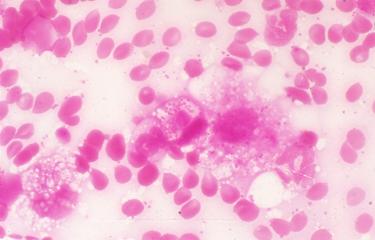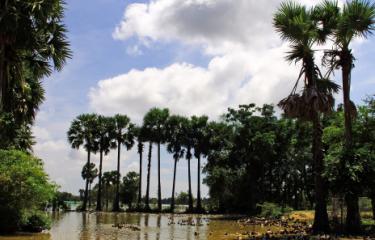While the main outcome of COP28 was an agreement calling on the parties to "transition away from fossil fuels" with the aim of limiting climate change, it was also the first COP to include a Health Day. Rising global temperatures, extreme meteorological phenomena and ecosystem change are not merely environmental concerns. They are catalysts of a silent epidemic that is affecting human health. Among the main threats are insect-borne diseases, which have long been a focus of research at the Institut Pasteur, and the spillover of viruses from animals to humans.
"We have now reached a point that the experts in the IPCC anticipated 50 years ago. The reality of climate change is no longer in doubt. The acceleration of extreme events [Ed. drought, fires, etc.], rising sea levels, melting glaciers and ocean acidification confirm it," explains paleoclimatologist Jean Jouzel, who was invited to the Institut Pasteur on November 28 to discuss the issue of climate and health (see photo below).

The 28th UN Climate Change Conference (COP28) was held in Dubai from November 30 to December 12, 2023. This COP reaffirmed the target of limiting warming to +1.5°C, but "even though many countries have set themselves the goal of achieving carbon neutrality by 2050, there is a huge gap between intentions and reality. At the current rate, we are on track for a 3°C rise by the end of the century!" evaluated Jean Jouzel during the event at the Institut Pasteur.
For the first time at this COP, the countries examined the effects of climate change on health, on Monday December 4, 2023. Heatwaves, extreme rainfall, drought – "all these extreme events caused by climate change have consequences for human health," stressed Valérie Masson-Delmotte, a climate scientist at the French Alternative Energies and Atomic Energy Commission (CEA) and an expert on the IPCC from 2015 to 2023, who presented the Institut Pasteur’s doctoral graduates with their PhD certificates at the graduation ceremony on December 8. She spoke to us about the most harmful of these consequences (see the video below).
Climate and health: Valérie Masson-Delmotte, a climate scientist at the CEA and expert on the IPCC from 2015 to 2023, answered our questions:
- What is the direct impact of climate change on human health?
- Are there indirect effects on health?
- What should we do to tackle climate change?
- How is health taken into account by climate experts?
Climate change has multiple consequences for health.
These include:
Hyperthermia
Hyperthermia is when the body's temperature goes above normal levels (between 36.5 and 37.5°C), and often above 40°C. It is caused by an accumulation of heat, especially as a result of heat stroke or heatwaves. It leads to excess mortality, and those who work outside are particularly at risk. In Europe, no fewer than 70,000 deaths were caused by heat during summer 2022. And the medical journal The Lancet recently warned that if the planet warmed by 2°C above preindustrial levels, the number of heat-related deaths every year could increase fivefold!
The resurgence in infectious diseases – a health challenge tackled by the Institut Pasteur since its early days
Rising temperatures are expanding the habitats of disease-carrying animals such as mosquitoes and ticks and are also extending the season during which they are active. This means that regions that were once spared are becoming vulnerable to diseases like malaria and dengue, as well as tick-borne diseases. The threat of tropical diseases is creeping towards new regions and historically temperate climates, representing a challenge for health systems and vulnerable populations in dealing with these emerging health crises. "The mosquito season, during which mosquitoes transmit diseases, is becoming longer. Diseases like dengue and chikungunya are set to become a real cause for concern in countries in the Global North," explained epidemiologist Arnaud Fontanet on November 28 at the Institut Pasteur.
In Paris, the course on medical entomology (the study of insects), taught at the Institut Pasteur since 1988, continues to provide training for experts worldwide. Anna-Bella Failloux and Didier Fontenille, co-authors of the book Mosquitoes, public enemy number 1? and recognized experts on the topic, both took the course themselves.
A new Center for Vector-Borne Diseases is currently under development at the Institut Pasteur. It will house all the Institut Pasteur's expert teams on microbes, hosts and vectors. They will work together to develop diagnostic tools and future vaccines or treatments. The unique center will foster collaboration between teams to help anticipate future epidemics and to reduce and control risks.
It is not just vector-borne diseases that represent a threat; we are also at greater risk of the emergence of new viruses because animals and humans are living in closer contact. Pathogens that spread from animals to humans are known as zoonoses.
Video "Zoonoses: how can a disease pass from animals to humans?" with Sarah Merkling, a scientist in the Insect-Virus Interactions Unit at the Institut Pasteur/CNRS.
"Deforestation in conjunction with climate change will accelerate the exchange of viruses between animals and therefore increase the risk of pandemics," explains Arnaud Fontanet. Growing urbanization and increasing population movements will also facilitate the transmission of emerging diseases.
The psychological impact of climate-related phenomena
Hurricanes, flooding, forest fires – these phenomena have a major impact on psychological health, whether because of the trauma of forced displacement, the ongoing fear of recurrent catastrophes or distress about the worsening state of the planet (known as climate anxiety).
Air pollution exacerbated by climate change in urban areas
Air pollution is becoming a major factor in respiratory disorders, which are now increasingly common. Vulnerable populations, especially children and elderly people, are most affected by these health problems.
Water shortages and contamination
Because rainfall patterns are changing, water scarcity and water quality degradation are contributing to an increase in waterborne diseases. A lack of access to drinking water, associated with more prevalent heatwaves, is causing dehydration and heat-related diseases, especially among vulnerable communities.
Food security affected by climate change
Changes to temperatures and precipitation are disrupting farming systems, resulting in malnutrition and foodborne diseases. Staple crops are becoming less reliable and communities are faced with an increased risk of nutrient deficiencies.
Some recent publications by the Institut Pasteur on climate and health, and also on issues related to food security:
-
Institut Pasteur welcomes new, comprehensive relationship with UCSF QBI
-
The tiger mosquito can transmit the chikungunya virus in temperate conditions
-
Malaria: treatment of Plasmodium falciparum malaria patients under threat in the Horn of Africa
-
Crimean-Congo hemorrhagic fever: our fact sheet emphasizes the fact that because of climate change, the range of the vector species is likely to expand across mainland France in the coming years.
-
How the respiratory tract microbiome influences the severity of bacterial pneumonia: the increase in cases of Legionnaires' disease could be related to climate change, as a result of higher water temperatures and more frequent flooding.
-
Food safety and antibiotic resistance: the fight against Listeria and Salmonella
-
National Reference Centers, sentinels guarding against pathogens
The Institut Pasteur's experts shared their views at the conference The city of the future at the Collège de France (Nov. 30– Dec. 1, 2023):
- Philippe Sansonetti, microbiologist and Professor at the Institut Pasteur and the Collège de France: How the pressure of climate change is transforming microbial ecosystems
- Didier Fontenille, research director at the French Research Institute for Development (IRD) and former Director of the Institut Pasteur du Cambodge, who took the Institut Pasteur's medical entomology course as part of his training: The entomological risk facing cities of the future





